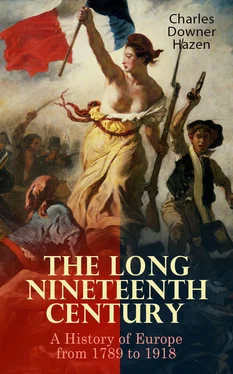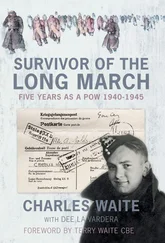Charles Downer Hazen
The Long Nineteenth Century: A History of Europe from 1789 to 1918
e-artnow, 2018
Contact: info@e-artnow.org
ISBN 978-80-268-9934-1
Preface
Chapter I The Old Regime in Europe
Chapter II The Old Regime in France
Chapter III Beginnings of the Revolution
Chapter IV The Making of the Constitution
Chapter V The Legislative Assembly
Chapter VI The Convention
Chapter VII The Directory
Chapter VIII The Consulate
Chapter IX The Early Years of the Empire
Chapter X The Empire at Its Height
Chapter XI The Decline and Fall of Napoleon
Chapter XII The Congresses
Chapter XIII France Under the Restoration
Chapter XIV Revolutions Beyond France
Chapter XV The Reign of Louis Philippe
Chapter XVI Central Europe in Revolt
Chapter XVII The Second French Republic and the Founding of the Second Empire
Chapter XVII The Making of the Kingdom of Italy
Chapter XIX The Unification of Germany
Chapter XX The Second Empire and the Franco-Prussian War
Chapter XXI The German Empire
Chapter XXII France Under the Third Republic
Chapter XXIII The Kingdom of Italy Since 1870
Chapter XXIV Austria-Hungary Since 1848
Chapter XXV England From 1815 to 1868
Chapter XXVI England Since 1868
Chapter XXVII The British Empire
Chapter XXVIII The Partition of Africa
Chapter XXIX Spain and Portugal
Chapter XXX Holland and Belgium Since 1830
Chapter XXXI Switzerland
Chapter XXXII The Scandinavian States
Sweden and Norway
Chapter XXXIII The Disruption of the Ottoman Empire and the Rise of the Balkan States
Chapter XXXIV Russia to the War With Japan
Chapter XXXV The Far East
Chapter XXXVI Russia Since the War With Japan
Chapter XXXVII The Balkan Wars of 1912 and 1913
Chapter XXXVIII The European War
Chapter XXIX Making the Peace
Table of Contents
To all thoughtful persons the European War has brought home with overwhelming power the importance of a knowledge of modern European history. For without such knowledge no one can understand, or begin to understand, the significance of the forces that have made it, the vastness of the issues involved, the nature of what is indisputably one of the gravest crises, if not the very gravest, in the history of mankind. The destinies of every nation in this world and the conditions of life of every individual will inevitably be changed, and may be profoundly changed, by the outcome of this gigantic and portentous conflict. No citizen of a free country who takes his citizenship seriously, who considers himself responsible, to the full extent of his personal influence, for the character and conduct of his government, can, without the crudest self-stultification, admit that he knows nothing and cares nothing about the history of Europe.
If he cares for his own national inheritance and tradition, for its characteristic and fundamental policies and principles, then he will care most emphatically about what happens in Europe. Nothing that happens there is really foreign to us, for the fortunes of Europe and America are inextricably intertwined.
This, in my opinion the most outstanding fact in the modern world, was exemplified in the eighteenth century in the person of Lafayette, an American patriot and a French patriot, a hero of two revolutions.
In Lafayette's library hung appropriately side by side two momentous documents, the American Declaration of Independence and the French Declaration of the Rights of Man, two utterances that have had memorable consequences in the world because multitudes of men have been willing to give their lives that these principles might prevail and multitudes have given their lives that they should not prevail.
Fundamentally this struggle for liberty has been the warp and woof of modern European history and the vicissitudes of the struggle are, in the deepest sense, what I have attempted to set forth in this volume.
Complicated, exceedingly, has been the history of this conflict, and many other elements have entered into the problem and solution. These I have given their due place, but I have also endeavored to keep them in just subordination to the central theme.
As furnishing the background for the story, I have described in the opening chapters the chief features of the eighteenth century, the Old Regime in Europe and in France. That regime was boldly challenged and roughly handled by the French Revolution. I have endeavored to indicate the spirit and meaning of that revolution as well as to describe its stirring events and personalities.. That revolution clashed with Europe and started a European revolution, which has had its ups and downs, its victories and defeats, its varying issues in the different countries. The contest assumed the character of world warfare under Napoleon, who said of himself that he was "the Revolution"and that he had "killed the Revolution." Neither statement was correct; yet each possessed an element of truth. This essential duality of the Napoleonic system, Old Regime and New Regime commingled in impossible union, I have sought to make clear.
Napoleon partially conquered the New Regime, and those who conquered Napoleon and sent him to St. Helena were anxious to conquer it still more. They for a while succeeded, but in the end the new spirit which was abroad in the world was too strong for them and they and their works were severely battered by the widespread revolutions of 1848. To those who are content to look at the surface, the revolutions of that year seemed ephemeral; to those who look beneath they appear anything but ephemeral.
This ebb and flow has been the rhythm of European history since the close of the eighteenth century. The new has indisputably progressed, but it has progressed unequally in the different countries, as was natural and inevitable, since those countries are very dissimilar in character, in stages of development, and in mental outlook. This all-absorbing conflict has not yet ended.
This struggle for freedom has had many aspects. The spirit of nationalism, so prominent a feature of the nineteenth century, has in some cases been an expression of the desire for liberty; in other cases it has been the expression of the old familiar desire for national greatness and power, nothing more. I have attempted in my narrative to show the varying operation of this spirit in the different countries.
Again, where economic and social factors have been formative in national policy, I have described them, as for instance the conditions that prevailed in France before the Revolution, the free trade movement in England, the abolition of serfdom in Russia, the Zollverein in Germany, the tariff policies, the labor legislation, and the various measures of social reform which have been a growing feature of the modern world.
In the treatment of the past century I have drawn freely upon my larger work, Europe Since 1815. The numerous illustrations which accompany the text have been selected with reference to their historical importance, and it is hoped that they will render the scenes and persons they portray more actual. I am greatly indebted to Dr. Ernest F. Henderson and his publishers, Messrs. G. P. Putnam's Sons, for permission to use several illustrations from Dr. Henderson's vivid and illuminating book Symbol and Satire in the French Revolution; and to Miss Louise Stetson Fuller of the Department of History of Smith College for the preparation of the Index.
C. D. H.
COLUMBIA UNIVERSITY, January, 1917
PREFACE TO THE REVISED EDITION
This book appeared originally early in 1917. I have since then added an account of the Great War ending with the armistice of November, 1918. I have, however, allowed the earlier chapters to stand as they were written in spite of the obvious incongruity of some of the tenses employed in them. This arrangement is provisional only; meanwhile no one is likely to be deceived or confused, the change in the situation of the world, rendering such formal alterations desirable, having occurred so recently.
Читать дальше












